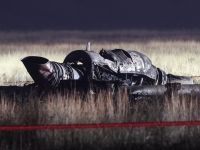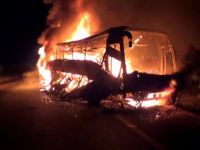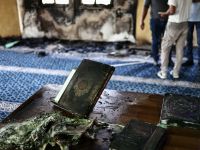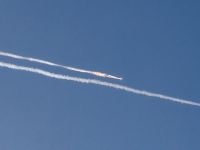There is growing concern that northern Israel will soon heat up, following a Hizbollah bomb attack on an Israeli army patrol on Thursday and widespread demonstrations by Palestinians in Lebanon demanding free access to the frontier, according to The Jerusalem Post.
A chain of bombs, some of which had been planted within five meters of the border on the Lebanese side, exploded as the soldiers passed in armored Hummer vehicles in the disputed Shabaa farms region on the Israeli-Lebanese-Syrian borders.
“The group the Martyrs of the al-Aqsa Intifada in the Islamic Resistance (Hizbollah's military arm) targeted a Zionist convoy in the region of Shabaa Farms at 3:20 (1320 GMT)," a Hizbollah statement faxed to AFP said.
"The group detonated a number of explosive charges which scored direct hits," it said.
Lebanese police said smoke billowed into the sky behind the Israeli army position in Sammaqa in the mountainous areas.
Residents in the nearby village of Kfar Shouba told AFP that they heard machine-gun fire shortly after the explosion and that they saw an Israeli helicopter hovering over the region at low altitude.
One soldier was thought to be suffering from concussion and was taken to Safed's Rebecca Sieff Hospital for examination, but was later released, according the Post.
Security sources said there was some confusion at first, because other explosions had been heard deeper inside south Lebanon, “apparently caused by mine-clearing work by UNIFIL sappers.”
The Israeli army categorically denied Lebanese media reports that the helicopters had opened fire while over Lebanese territory, said the paper.
According to the daily, Israeli military intelligence warned several months ago of a flare-up along the northern border in the event of prolonged hostilities in the territories, with the prospect of Palestinian groups based in Lebanon joining the fray aided by Hizbollah.
The latter has already announced its intent to continue attacking Israel, until the Shabaa farms are liberated and Lebanese prisoners - including Hizbollah Sheikh Abdel Karim Obeid and Mustafa Dirani of Amal – are freed from Israeli jails.
The Jerusalem Post said that there are signs of mounting unrest among the estimated 300,000 Palestinian refugees living in Lebanon, which Western diplomatic sources note with concern.
The Lebanese Army has checkpoints on roads leading south as well as some in parts of south Lebanon itself, and troops and police have been restricting the flow of demonstrators wanting to reach the border with Israel.
”In fact the only ‘excursions’ that have been permitted have been those organized by Hizbollah, which furnishes buses to take Lebanese and Palestinians to the frontier, apparently along with lunch packs and ample supplies of rocks to hurl at troops of the ‘Zionist enemy’ when they reach their destination,” according to the Israeli daily.
Given the recent widespread demonstrations by Palestinians in refugee camps throughout Lebanon, the Western diplomatic sources were quoted by the paper as saying “there is genuine concern this could become a popular tide the Lebanese authorities would find difficult if not impossible to stem.”
They added that if casualties were incurred among Lebanese demonstrators as a result of Israeli fire, it would only be a short step to Hizbollah unleashing the arsenal of mortars and Katyusha rockets it has deployed throughout south Lebanon against Galilee communities, and perhaps even farther south.
Two weeks after the kidnapping, a previously unknown group calling itself the Shaba Liberation Brigade staged an unsuccessful attempt to infiltrate Israel and attack civilian targets at nearby kibbutzim Dan and Dafna, said the daily.
According to The Jerusalem Post, the Israeli withdrawal from the occupied zone in south Lebanon means that “Hizbollah can bring its conventional 107 mm and 122 mm Katyushas closer to the border, putting places like Safed, Karmiel, and Acre well within range of these larger rockets.”
There is more up the movement’s sleeve, according to the paper. It said Hizbollah has also reportedly acquired Fajar missiles, an improved version of the Katyusha, which has a longer range but a smaller warhead. These would certainly be capable of reaching Haifa's bayside suburbs.
Were Hizbullah to launch any kind of cross-border attack, said the daily, Israel would be forced to implement its threat, made after the May 24 withdrawal, to respond severely against Lebanese and Syrian interests - and from there it would only be a short step toward a wider-scale conflict – (Several Sources)
© 2000 Al Bawaba (www.albawaba.com)







